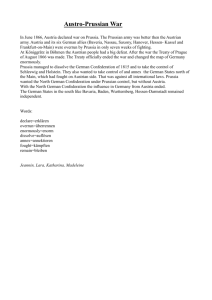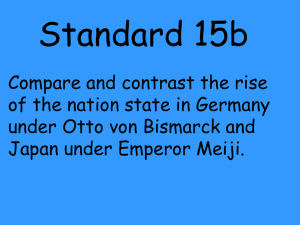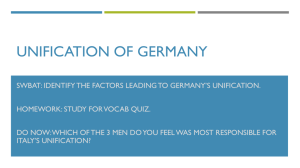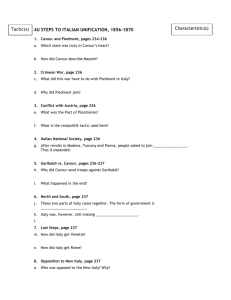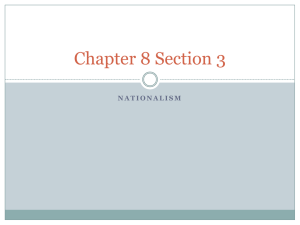Germany and Unification 1862
advertisement
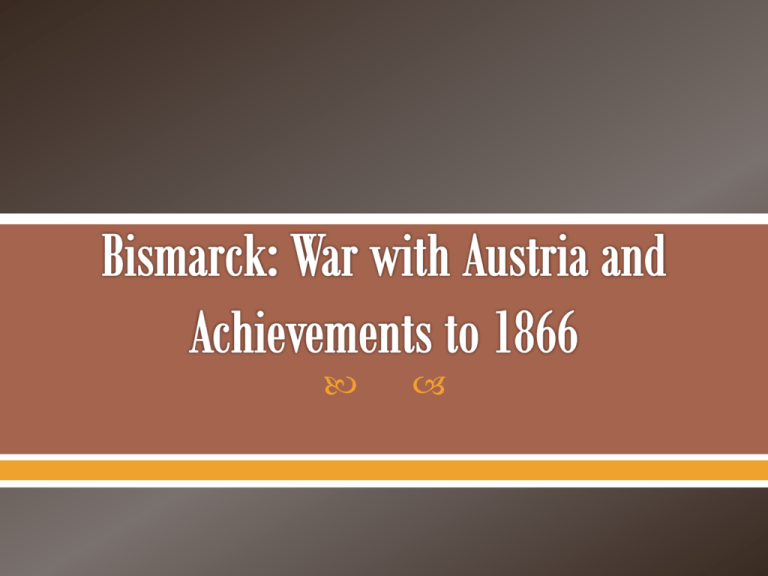
August 1865- Prussia: Schleswig, Austria: Holstein Prussia, for the first time had taken the lead on political affairs- weakness of Austria “Overnight the Bismarck cult was born”- Prussian liberals seemed to be won over despite the constitutional infringements A spark for the German cause? Was there a hidden purpose to Bismarck’s actions in Denmark? Was Gastein a trap created by Bismarck? Likely not, but it did allow him to bide some time Prussia until 1866 had concerns regarding any action against Austria- army size, tactics, yadda yadda but more importantly what would other nations think? France- Oct/Nov 1865- Bismarck meets with Napoleon IIIconfident of French neutrality Italy- signed an economic and military alliance with Prussia against Austria with the reward being Venetia Prussian had demanded from Austria the acceptance of their supremacy in northern Germany Austria, unusual for them, agreed to this However, they agreed only with the demand that Venetia be retained as a condition This allowed Bismarck to reject the offer due to his alliance with Italy, which now gives his a legitimate impulse to start a war Prussia invades Holstein (see game slide) The war can be seen in the light of a “Prussian trial of strength”- the reforming of the army which began in 1850 The war is not just against Austria but her allies or her dominions within the German states- Saxony, Hanover, Bavaria, Wurtemberg, Baden and others Its should be more of a war of northern German conquest by Prussia The German allies were quite poor as military forces- bad communication and there are many battles where those individual states were eliminated by the Prussians Sadowa (or Koniggratz) July 1866- Austrian losses- 20,000 to 9,000 Prussian Three weeks later an armistice was signed- not just due to Prussian might- other forces made Austria surrender Nationalist “rumblings” in the east, plus the fearful reaction by France and Russia to the quick dominance of Prussia, and Bismarck’s realization of the problems of logistics: “Our power finds its limits, when the supply of Junkers to fill official posts gives out” Caused great disruption in the European state system and the balance of power “the entire Prussian campaign has no parallel in the history of the world. The consequences of the Battle of Sadowa are at least as follows: the unification of Germany through Prussia, the consummation of Italian Independence, the fall of the power of Papacy, the deposition of France from the dominion she has usurped over Europe”- Ferdinand Gregorovious Gee, tell us what you really think there Ferdinand! Prussia was able to annex a multitude of German states Received the right to form all German territories north of the river Main into a new Northern German Confederation The German Confederation was now dead Austria suffered no territorial losses (except for Venetia to Italy) Austria did give up a bigger reward- prestige and status Austria was no longer influential in German states or in Italy- hello Balkans and hello WW1 Compromise of 1867- Ausgleich- Hungary was part of the constitutional monarchy, free from Austrian influence Partial unification of Germany- how do the liberals react? They wanted this, but not by the means it had been achieved Essentially the liberals forgave Bismarck and saw what they needed to see- a hero, a leader, whatever… Now he does something interesting- he stands before the Reichstag (new parliament of the German Reich) and admitted to acting illegally for 4 years He asked for their forgiveness and their pardon (Act of Indemnity- 230 votes to 75) The split resulted in a new political party- National Liberals- free trade and rule of law, but were on the side of Bismarck- sly dog Act of Indemnity- an enlightened and moderate compromise? Liberals became victims to their own limited ends, they lack of genuine support and their lust for national power? Bismarck and the Liberals were a complex relationship- He genuinely appreciated their economic theories and aims and kleindeutsch (national unity) The new confederation rested solely upon Prussia military power Hanover’s ruling dynasty was deposed and its wealth confiscated- true nature of Prussian dominance coming to light Here is the odd part- Bismarck made the confederation into a compromise- a parliament of elected officials- why didn’t he just institute Prussian monarchical rule? To be more inviting to the south? To play off nationalist and independence sentiment within the states- (5/6 of the new Confederation were in fact the population of Prussia) Freedom of speech, universal manhood suffrage, freedom of the press, parliamentary approval of the budget every 4 years But… Bismarck retained some very intense power- Most taxes were indirect- Zollverein duties and customs- beyond the control of the parliament The only minister that was responsible to the state was Bismarck- all others were therefore responsible to him Not a single federal minister in the whole parliament Only body that could legislate was the Bundesrat- filled with appointed representatives of the states What had Bismarck achieved by 1866?
